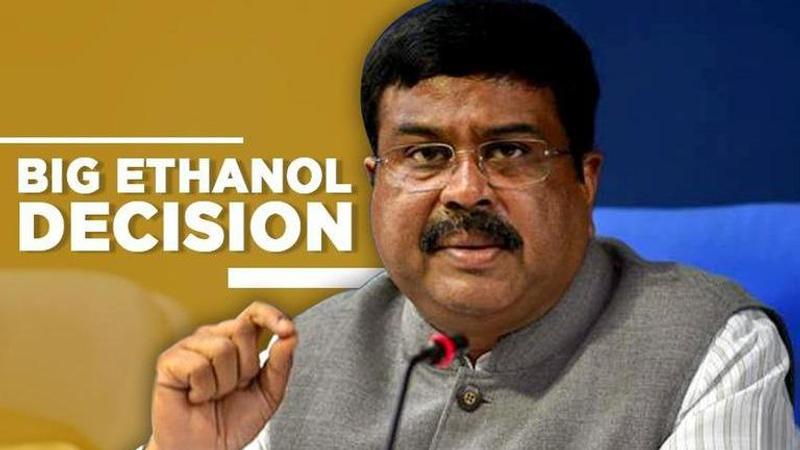Published 18:28 IST, September 3rd 2019
CCEA raises Ethanol price for blending in petrol, eyes saving $1 Bn
Ethanol price for blending in petrol increased to ₹1.84 per litre, govt eyes reducing oil bill by $1 billion annually through its greater use in auto fuel

The central government on Tuesday raised the price of sugarcane-extracted ethanol used for blending in petrol by up to Rs 1.84 per litre as it looked to cut its oil import bill by $1 billion annually. The Minister for Petroleum and Natural Gas, Dharmendra Pradhan, said State-owned oil marketing companies will buy ethanol from sugar mills, for mixing in petrol, at enhanced rates for the year beginning December 1. He was briefing reporters on the decisions taken by the Cabinet Committee on Economic Affairs (CCEA), chaired by Prime Minister Narendra Modi. The price of ethanol from 'C-heavy molasses' has been raised by 29 paise per litre to ₹43.75 while the same from 'B-heavy molasses', also called as intermediary molasses, by ₹1.84 to ₹54.27 a litre.
Ethanol is a by-product of molasses generated on crushing of sugarcane and the higher price is to encourage sugar mills to divert from sugar production. Cane-based ethanol can be produced three different ways directly from cane juice, from B-grade and C-grade molasses. Pradhan said the higher price is expected to increase the procurement of ethanol to 260 crore litres between December 2019 and November 2020, up from 200 crore litres bought in the previous ethanol year. "Increased ethanol blending in petrol is expected to replace 2 million tonnes of oil annually, helping save $1 billion in import bill," he said.
Ethanol being doped will rise from 6% to 7%
The percentage of ethanol being doped in petrol will rise from about 6% now to 7% next year and to 10% by 2021-22, he said. Price of ethanol was last revised in September last year when the CCEA had approved a 25% hike in the price of ethanol produced directly from sugarcane juice to ₹59.13. Now it has been hiked to ₹59.48. At that time, the price of ethanol produced from B-heavy molasses was hiked from ₹47.13 to ₹52.43 but that from C-heavy molasses marginally reduced to ₹43.46 from ₹43.70.
Sugar industry responding positively
Commenting on the decision, Indian Sugar Mills Association (ISMA) director general Abinash Verma said: "Government's decision to increase ethanol price once again, with special emphasis and a higher increase for ethanol made from B-heavy molasses, confirms the government's commitment towards encouraging more diversion of the surplus sugarcane/sugar into ethanol. The second very important decision of allowing a single premium price for the ethanol made from partial or 100% sugarcane juice is another big and positive step in this direction," he said. "These decisions will help in further increasing the ethanol blend levels from the current 6% average levels across the country." The sugar industry, Verma said, is responding very positively by hugely investing in new or expansion of ethanol production capacities, which will help achieve the government's 10% ethanol blend targets by 2022. The world's third-largest oil consumer is dependent on imports to meet 83% of its needs and substituting some of the fuel with biofuels will help cut import dependence.
Read| Union Budget 2019: From Petrol & diesel to Gold, here's what got cheaper and what got costlier
In India, ethanol is mainly produced from sugarcane molasses by the fermentation process. Ethanol can be mixed with gasoline to form different blends. As the ethanol molecule contains oxygen, it allows the engine to more completely combust the fuel, resulting in fewer emissions and thereby reducing the occurrence of environmental pollution. Since ethanol is produced from plants that harness the power of the sun, ethanol is also considered as a renewable fuel. The Ethanol Blended Petrol (EBP) programme was launched in January 2003. The programme seeks to promote the use of alternative and environmentally friendly fuels and to reduce import dependency for energy requirements
EBP programme launched in 2003
The Government of India decided to launch Ethanol Blended Petrol (EBP) Programme in January 2003 for the supply of 5% ethanol blended petrol. Subsequent to this, Ethanol Blended Petrol programme was launched in January 2003 in 9 States i.e. Maharashtra, Gujarat, Goa, Uttar Pradesh, Haryana, Punjab, Karnataka, Andhra Pradesh, Tamil Nadu and 4 Union Territories. The Ministry of Petroleum & Natural Gas (MoP&NG) vide its notification dated September 20, 2006, directed the Oil Marketing Companies (OMCs) to sell 5% EBP. At present, this programme has been extended to the whole of India except Union Territories of Andaman Nicobar and Lakshadweep islands with effect from April 1, 2019 wherein OMCs sell petrol blended with ethanol up to 10%.
'Price of sugarcane has been fixed at ₹59.48 per litre'
Ethanol blending in petrol increased from 38 crore litres in the ethanol supply year 2013-14 to an estimated 141 crore litres in the ethanol supply year 2017-18 and 200 crore litres in the following year. India spent $112 billion on import of 226 million tonnes of crude oil in 2018-19. Pradhan said the price of ethanol from sugarcane juice/sugar/sugar syrup route has been fixed at ₹59.48 per litre. "Additionally, GST and transportation charges will also be payable. OMCs have been advised to fix realistic transportation charges so that long-distance transportation of ethanol is not disincentivised," he said adding the use of alternative and environment-friendly fuels will reduce import dependence and give a boost to the agriculture sector. This comes at a time when a surplus of sugar production is depressing sugar price. Consequently, sugarcane farmer's dues have increased due to the lower capability of the sugar industry to pay the farmers.
(Inputs from PTI)
Updated 19:15 IST, September 3rd 2019




